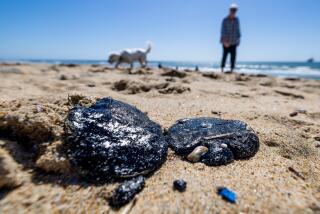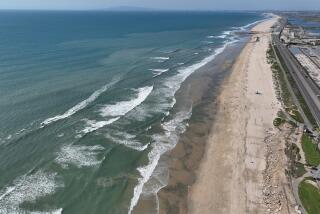Oil spill takes boom out of holiday weekend
Reporting from West Ship Island, Miss. — The sun was shining, the waves were inviting, and the sand was soft, but Cassie Cox gazed forlornly Saturday at row upon row of unrented, still-furled beach umbrellas on what is usually the busiest holiday weekend of the year.
“This is the saddest thing I’ve ever seen,” said Cox, who had rented only a dozen umbrellas to beachgoers all morning. “Last year at this time, we had more than 1,000 people here.”
Long known as a jewel of the Gulf Islands National Seashore, this three-mile barrier island was pristine until three days ago. Now, oily ribbons, tarlike pellets and sludge patties are spoiling the sugar-sand beach, marking another victim of the BP oil spill. Cleanup crews have yet to arrive.
“The entire coastline of the island has oil on it,” warned Patrick Hatcher, a National Park Service ranger who greets visitors from the ferry. “If you walk on the beach, you will get oil on you. If you swim in the ocean, you will get oil on you.”
Similar warnings cast a pall over the July 4 weekend at near-empty resorts and beachfront communities from Florida to Louisiana. In some areas, tourist bureaus, rental agents, condo owners and other officials said vacation bookings were down 20% to 80%.
Some resorts have slashed prices, waived cancellation fees, organized free concerts and stepped up non-beach attractions, such as bayou tours or trips to casinos. And the oil is fickle, sullying some areas and missing others.
On the beaches of Pensacola, in the western Florida Panhandle, local health officials issued a blanket warning against swimming in the warm gulf waters — or even walking on the beach — because of tar balls in the surf.
In Gulfport, Miss., organizers shifted the annual Deep Sea Fishing Rodeo to freshwater ponds and bayous because federal officials put nearly all the offshore fishing areas off limits for anglers. Fishing is now banned along the entire Mississippi coastline.
Officials in Alabama canceled annual fireworks displays in Bayou La Batre and on Dauphin Island, where a once-popular beach has been converted into a staging area for oil cleanup crews.
In Westwego, La., families who operate a decades-old clutch of 21 roadside seafood stalls worried that they may not survive the summer.
“This is a ghost town,” stall operator Ivis Fernandez, 43, said in frustration. “Usually we’re so packed now that the police come to direct traffic. We’re really struggling.”
Only a handful of customers drove up all morning to buy the often still-squirming bounty of the gulf from coolers — shrimp, soft shell crab, catfish, snapping turtle, alligator and more.
“A lot of people are scared,” said Brandi Bryant, 37, who works at another stall. “They ask us all day long if there’s oil or dispersant on the shrimp. I tell them the Board of Health comes here and we couldn’t sell it if it was bad.”
Seven of the stands, including Who-Dat Seafood and the Crab Shack, already have closed, at least for now.
Not everyone is feeling the pain. Hotels in and around New Orleans were packed, and the rowdy bars on and around Bourbon Street were jammed, as tens of thousands of convention-goers and vacationers poured into the Big Easy for the long weekend.
Motels along the oil-splashed coast are full of oil workers, boat crews, government officials and others involved in the cleanup. BP has hired thousands of local boats and fishermen for the operation, spending that will offset some of the hit to the region’s economy.
Still, thousands of dive captains, souvenir shops, ice cream stands, bait-and-tackle shops and others are hurting this holiday weekend.
Only 80 people boarded the Capt. Pete, the ferry that carries passengers across the wave-tossed Mississippi Sound to West Ship Island, 11 miles offshore, early Saturday. The tiny, treeless island has a Civil War fort and cemetery, as well as nesting grounds for pelicans and other birds.
“Normally, we’d run three boats and carry 800, 900 people,” said Beth Skrmetta, whose family has run the ferries since the 1920s. “This is a disaster. We’re running a skeleton crew. I don’t know how much longer we can keep going.”
With little to watch on the near-empty beach, lifeguards Ryan Fitzgerald and Mandy Thomas gave themselves extra work — they shoveled oil blobs off the sand into red plastic bags and carted them away.
But the oil kept washing ashore. Shortly after noon, Frank Zhang stood in his bathing suit and suddenly called to his two young children, Billy and Vivian, who were playing at the water’s edge.
“Get out of the water,” he shouted. “Now!”
The 37-year-old builder from Bay St. Louis, Miss., pointed to his bare feet. Both were splattered above the ankle with a brown, gooey glop. “This is so sad,” he said.
More to Read
Sign up for Essential California
The most important California stories and recommendations in your inbox every morning.
You may occasionally receive promotional content from the Los Angeles Times.











